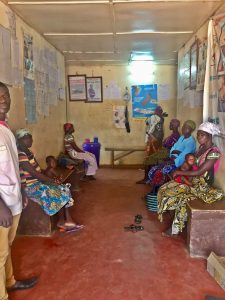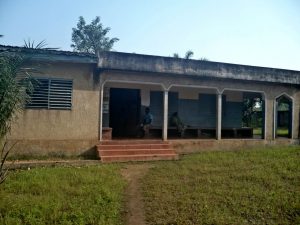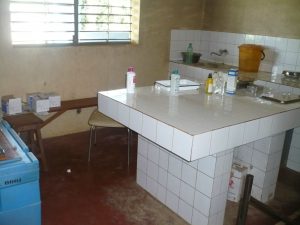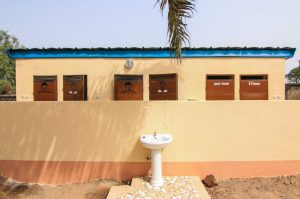This project is made possible through the partnership of WATER CHARITY and the NATIONAL PEACE CORPS ASSOCIATION. ![]()
This project has been completed. To read about the conclusion, CLICK HERE.
 Location
Location
Village of Sarakawa, Kozah District, Kara Region, Togo
Community Description
Too many mothers and children die needlessly in Togo. 368 mothers die for every 100,000 live births and roughly 1 in 10 children born in Togo will die before their 5th birthday: an astounding 15 times the child mortality rate of developed countries. The majority of these deaths are caused by easily preventable conditions that could be treated at very low costs. Furthermore, the majority of these deaths happen in the neglected, northern region of Togo, in villages like Sarakawa.
Sarakawa is a village an hour northwest of the city of Kara. Although the landmass is large, villagers are farmers and live far apart. The population of 5,582 is a combination of Kabiyè and Losso ethnicities.
Prior to the partnership with Hope Through Health (HTH), the health center in Sarakawa was severely understaffed and therefore received barely any community members.
Problem Addressed
HTH works to overcome barriers to good health by eliminating user fees for patients, deploying Community Health Workers, mentoring nurses and midwives in public clinics, and improving supply chains in nine communities across northern Togo, including Sarakawa. They have been able to make excellent strides toward reducing mortality and morbidity in Sarakawa, but the state of the health center remains a limiting factor.
The Sarakawa Health Center is in need of extensive repairs and renovations, including improved water source and plumbing. The Sarakawa health center provides lifesaving care to a population of 5,582, all without running water. At the Sarakawa clinic, staff members are currently using a community water pump (hand pump) and water is being carried from this source.
 Without proper plumbing, this clinic is ill-equipped to provide high-quality healthcare services to meet the needs of the surrounding communities.
Without proper plumbing, this clinic is ill-equipped to provide high-quality healthcare services to meet the needs of the surrounding communities.
Project Description
Hope Through Health, in partnership with Construction for Change (CFC) and the 30/30 Project, will renovate the Sarakawa Health Center in the village of Sarakawa so that the quality of the building matches the excellent services being delivered inside its walls. Fixing the water supply will be a major aspect of this renovation.
HTH and partners will build the Sarakawa Health Center its own water source on the property. This will include a 7m tall concrete water tower, a 3 m3 water storage polytank, and a 2 KVA hydraulic pump.
Project Managers from CFC who are based in Togo will oversee this project. They have already performed site assessments and have a detailed outline of how to accomplish each of these tasks. They will hire a Togolese construction company to complete the work. The construction company will hire some members of the community as laborers for the duration of the project. All major decisions on renovations will be made in collaboration with the Togolese Ministry of health.
Funds from Water Charity will go specifically to labor and materials costs associated with improving the water source at the Sarakawa Health Center.
 Project Impact
Project Impact
5,582 people will benefit from the project
Returned Peace Corps Volunteer Directing Project
Jennifer Schechter, RPCV and Executive Director, Hope Through Health. HTH is also implementing the Djamde Health Clinic Water Project – Togo.
Monitoring and Maintenance
CFC Program Managers will be overseeing the project’s progress until completion. Upon completion of the project, HTH will monitor the functioning of the clinic and assure that all technology is running smoothly. HTH’s Clinical Mentor will visit the Sarakawa Health Center two times a month for ongoing coaching; during these visits, he will be able to take note of any issues.
In addition, HTH will collect on a monthly basis service indicators from the Sarakawa Health Center, including the number of children under five treated, the number of facility-based deliveries, and the number of women who adopt family planning methods. Monitoring these indicators will also help HTH see how the renovation project is contributing to the health of the community.
Renovating the Sarakawa Health Center is a sustainable project because it is a top-off investment to what the Ministry of Health (MOH) is already investing in the Sarakawa Health Center. The MOH pays the salaries of staff for the clinic as well as other ongoing costs such as utilities.
With the renovated clinic, HTH expects coverage rates to increase, meaning that the MOH is able to reach more patients with their current investment. Instead of building our own brick and mortar, HTH believes in strengthening the preexisting health centers with the ultimate goal of government adoption, making our impact sustainable over the long term.
This project has been funded by an anonymous donor. Please donate to Water Charity for use where needed most, so that we have funds on hand for the next project.
Conclusion of Sarakawa Health Center Water Project – Togo
 This project has been completed under the direction of Returned Peace Corps Volunteer Jennifer Schechter. To read about the start of the project, CLICK HERE.
This project has been completed under the direction of Returned Peace Corps Volunteer Jennifer Schechter. To read about the start of the project, CLICK HERE.
The project was designed to build a borehole and water supply system at the health center.
Jennifer reports:
Scope of Project
The goal of the Sarakawa Clinic Renovation project was to improve the public health center in the underserved village of Sarakawa in northern Togo so that it could meet the needs of the community and ensure high-quality healthcare for all. This renovation project was designed to complement and support Hope Through Health’s work to make high-quality healthcare accessible to this community, by integrating Community Health Workers with improved public clinics.In order to achieve the overall goal of ensuring the quality of the building matches the excellent services being delivered inside its walls, the primary objective was to establish an improved water source at the clinic, including the installation of a hydraulic pump, water tower, and storage tank. In addition, other renovations were planned to fix longstanding problems:
*Improve the existing, unusable latrines to be clean and functioning toilets with running water
*Repair roofing to prevent leaks and molding inside the clinic
*Replace the water-damaged drop-ceiling
*Remove mold, repaint the walls, and tile the floors and lower walls
*Replace metal doors and windows and install mosquito screens
*Build an incinerator for appropriate medical waste disposal
*Repair faulty electrical wiring and equipment to provide reliable electricity for lighting and power
Process
The first step of the renovation project was to conduct a site assessment in January 2016 to determine the most needed improvements and outline how best to address these priority issues. Hope Through Health (HTH) partnered with Construction For Change (CFC) on the Sarakawa, Kpindi, and Djamde Clinic Renovation projects. CFC project managers arrived on site in August 2017. HTH program team members and CFC project managers worked together to create a prioritized list of improvements based on their anticipated impact and cost. The provision of an improved water source was at the top of the list.In September 2017, CFC project managers evaluated seven different local construction teams based on their quality of work and capacity to complete the project within the desired timeframe and price. Expertise in water drilling and pumping in the local context was a major factor in selecting a partner.
Following conversations with the clinic staff about minimizing disruption to the clinic, it was decided not to stage the renovation room by room but rather to finish the most disruptive interior work all at once and as quickly as possible. Timeliness was therefore a particularly important criterion for the local construction team. The project managers hired an excellent team, L’eau Pour Le Togo (Water for Togo), which was able to complete the work, under their supervision, ahead of schedule and under budget. HTH was therefore able to add a couple of items from the wish-list of improvements, including the construction of a shaded outdoor area for community health talks and for spillover waiting space during crowded mass vaccination days.
In October and November 2017, the construction team worked simultaneously at the three clinic sites in Sarakawa, Djamde, and Kpindi. Within each site, they were divided into small sub-teams that focused on the plumbing, roofing, and interior improvements, so that the entire process was completed in a choreographed flurry.
The project proceeded without major complications. The project managers rotated through the three clinic sites under construction and mentored the construction team on installing the new electric pump and associated plumbing lines for the improved water system.
After the completion of the renovation project in December 2017, CFC project managers toured the site with the Kozah District Health Director, who was delighted to see the improvements. He called on the clinic staff to respect their workplace by cleaning as necessary and welcoming new patients warmly. The HTH Clinical Mentor continues to visit Sarakawa two or three times every month to provide guidance, monitor for quality, and ensure that the clinic is in good condition.
End result
By December 2017, all project objectives had been met. Most notably, a new hydraulic pump was installed as well as a seven-meter water tower and holding polytank. Plumbing was officially installed in the clinic as well as outdoor latrines. In addition to this primary objective, all other goals were met:*Renovated latrines with “Western” and “Turkish” toilets and running water
*New roof structure to prevent water leaks and improve water management with new concrete pillar for structural reinforcement
8Ceiling and walls replaced or repaired
*Mold removed and walls, floors, and ceilings repainted or tiled
*New doors and new glass windows with mosquito screens
*New incinerator with ash pit and chain link fencing
*Improved electrical wiring in the clinicSome additional renovations were accomplished as well:
*New light fixtures in the clinic and latrines with receptacle outlets brought up to code
*New electric refrigerator for holding immunizations
*New shaded outdoor seating structure for community gatherings with electrical outlets
*New shaded garage structure for rural ambulance
When asked to comment on the renovations of the clinic as a whole, every single community member and health worker we spoke to immediately highlighted the provision of water to the clinic. While the structural improvements to the clinic are more visible, the provision of water has had the biggest impact on patient experience in the facility.
Community Involvement
The Sarakawa Clinic Renovation project was designed with local capacity-building in mind. The local construction team selected was chosen largely for its expertise in installing wells. Because they are based in the region, they will be available to repair the wells if needed and can teach members of the community about maintenance and repair of the wells. As many skills as the construction team brought to the project, they were also eager to learn about construction best practices from the CFC project managers. In particular, the CFC project managers shared techniques for designing the roof and water management systems to prevent leaking, cracking, and earth erosion around the building.Mr. Awesso, head nurse at the Sarakawa clinic, had a similar testimony:
“The renovations were a very good thing because now there is water at the clinic. Before, women would have to find someone to go get water for them. It was a big problem. Now we can have water ready immediately.”
Akondo Yaa, a 23-year-old mother, shared her firsthand experience delivering at the clinic:
“I gave birth at this clinic last year, after talking to my community health worker about the advantages of giving birth in a clinic. I knew if the delivery took too long, there were products that they could give me to make it go faster, and if there were dangers the staff could take care of them. I was lucky that everything went smoothly. But there was no water on site, so I had to have someone go find water for me. It took about 30 minutes to get the water, so the clinic used the water that the cleaning lady had gathered earlier in the day in the meantime. I want to have another child in the future, and I will give birth at the clinic again. It is a big benefit to know that now there is water right there—I don’t have to worry about it again.”Conclusion
HTH is incredibly grateful for the partnership of Water Charity in our efforts to ensure high-quality healthcare for all, starting in northern Togo. Thanks to your support, the Sarakawa Clinic has been transformed into a clean and safe space where the community can receive care with dignity.
We extend our thanks to Jennifer for completing this important project.